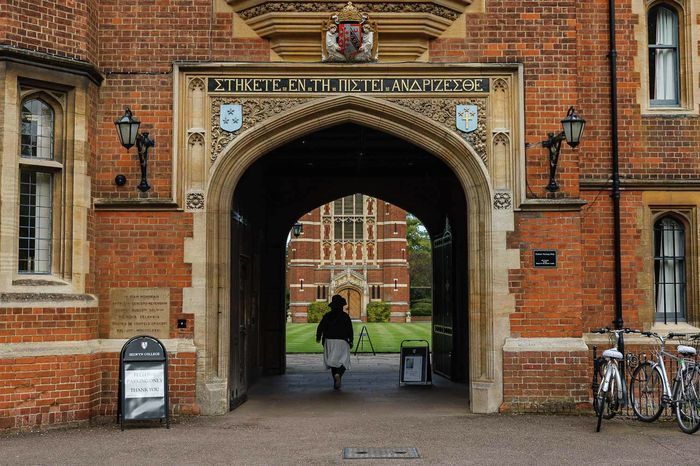University Council recommends Pro-Vice-Chancellor role for sustainability
This sixth Pro-Vice-Chancellor would ‘play a key part in driving progress’ on the University’s sustainability agenda

A new role of Pro-Vice-Chancellor (PVC) has been proposed, as the University faces recommendations to cut its research ties to the fossil fuel industry.
The new PVC would “play a key part in driving progress on the University’s sustainability ambitions on all fronts,” representatives of students and academics have said.
The University Council (UC), Cambridge’s principal executive body, published proposals for a sixth PVC role on Wednesday (25/10).
The creation of the role has been dubbed “promising” by student climate campaigners, but the University’s focus on “job titles” has been heavily criticised.
Fergus Kirman, the SU’s Undergraduate President has hailed the proposal as “welcome”, but said that “clear student involvement” in appointing the candidate is “essential.”
The University Council has proposed a sixth PVC role, which will be charged with a “responsibility for supporting all activities related to environmental sustainability across the University”.
The UC’s proposals make repeated reference to the Topping Report, which advised that the University’s financial ties to the fossil fuel industry pose “high reputational risk.”
The report, authored by former UN climate champion Nigel Topping, found in July that companies such as BP and Shell are not aligned with the University’s decarbonisation ambitions “on any level.”
Since 2016, Cambridge has received £19.7m in research funding and philanthropic donations from Shell and BP.
The existing system that the University uses to scrutinise ethics of associating with companies like these, which has been in place since 2018, was found by Topping to “lack clarity and transparency.”
The UC stated that the Topping report requires a “reset in approach” towards “the development of an overall institutional strategy in climate and sustainability, built on its interdisciplinary research strengths and encompassing its educational offerings, operations, and outreach activities.”
Jason Scott-Warren, a member of University Council and a signatory on the proposal for a sustainability PVC, described the Topping report as a “scathing indictment of the University’s history of taking fossil fuel funding” when it was released in July.
Cambridge Climate Justice (CCJ), a student activist group, told Varsity: “It’s promising [...] but this is yet another example of Cambridge University talking the talk on climate action. When it comes to the walk, they’re dragging their heels.”
“It’s not just a new Pro-Vice Chancellor that we need, it’s tangible action, making actual change in the face of climate breakdown,” CCJ said.
Sam Hutton, Chair of the SU’s Ethical Affairs campaign, said: “Introducing a new Pro-Vice-Chancellor seems like a big step, but they must be willing to take decisive action.”
“As the University’s climate initiatives continue to delay, obfuscate and greenwash, we need this position to disrupt the complacency in Cambridge decision-making, and not simply act as another mouthpiece for the empty rhetoric of complicity in the climate crisis,” Hutton told Varsity.
Kirman told Varsity: “It’s really welcome that the University is considering creating this new role; it would demonstrate a serious commitment to tackling the climate crisis that we’re facing right now.”
“It’s essential that whoever’s appointed to such a role has credibility and authority. Creating a properly empowered position, as well as ensuring clear student involvement in appointing the candidate, would guarantee that,” he said.
The proposal for the new PVC role requires approval from the University, and its focus on sustainability is yet to be confirmed. If approved, the UC will “give detailed consideration to the title and remit of the new role,” they have said.
The Financial Times reported in July that the Topping recommendations are expected to be accepted by the University, but this is yet to be confirmed.
A University spokesperson said: “The new Vice-Chancellor has already stated that one of her key priorities will be around climate and sustainability.”
 Music / The pipes are calling: the life of a Cambridge Organ Scholar25 April 2025
Music / The pipes are calling: the life of a Cambridge Organ Scholar25 April 2025 News / Candidates clash over Chancellorship25 April 2025
News / Candidates clash over Chancellorship25 April 2025 Interviews / Dr Ally Louks on going viral for all the wrong reasons25 April 2025
Interviews / Dr Ally Louks on going viral for all the wrong reasons25 April 2025 Comment / Cambridge builds up the housing crisis25 April 2025
Comment / Cambridge builds up the housing crisis25 April 2025 Arts / Plays and playing truant: Stephen Fry’s Cambridge25 April 2025
Arts / Plays and playing truant: Stephen Fry’s Cambridge25 April 2025






